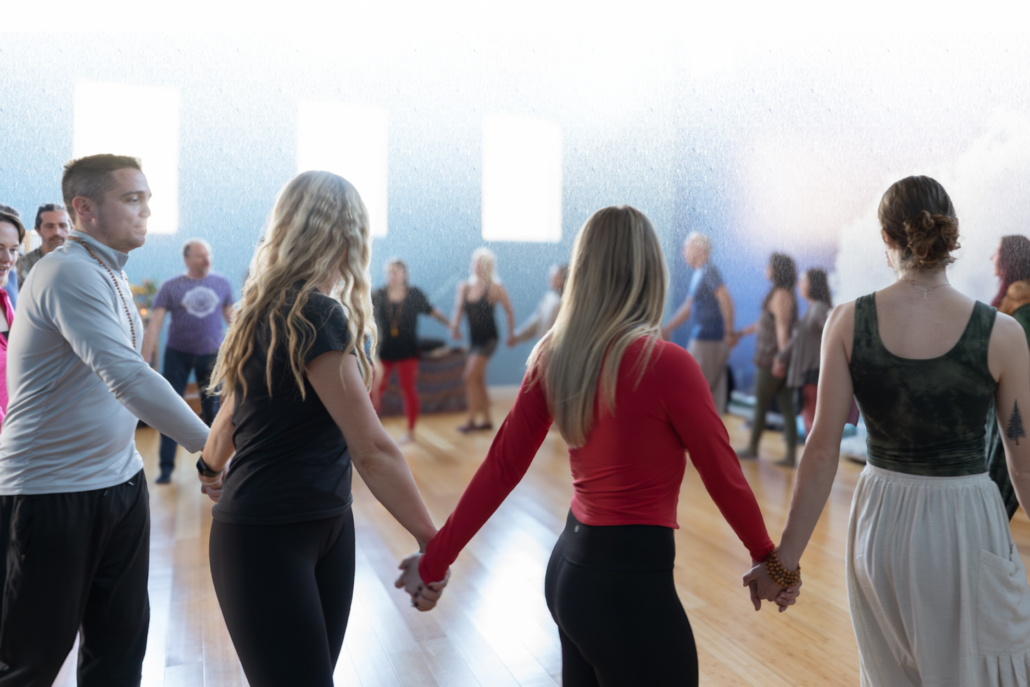Darrell’s Almost Step-By-Step Guide to Losing 45 Pounds with Man Flow Yoga | Darrell R. | Better Man Podcast Ep. 120
A few years ago, Darrell was walking up a hill, and noticed something that has never happened to him before: His hip writhed in pain from this seemingly simple task! At the time, Darrell was overweight. But he also...

Episode 120: Darrell’s Almost Step-By-Step Guide to Losing 45 Pounds with Man Flow Yoga - Darrell R. - Transcript
Dean Pohlman: Hey, guys, it’s Dean. I’ve got Darryl here to talk about reclaiming your fitness. So, Daryl, where are you from, by the way?
Darrell R: Sort of in Norwich, New York. You know, upstate New York, near Syracuse.
Dean Pohlman: Okay, cool. So let’s talk about your oh, shit moment. When did you realize that you weren’t where you wanted to be with your fitness, and it was time for a change?
Darrell R: Well, I remember well, it was April 2023. I was walking uphill. I live in an area that’s kind of hilly. I was walking uphill and my, left hip started to hurt and I hurt a lot.
Dean Pohlman:
Darrell R: And so I went to the doctor and the doctor did a few tests and an x ray. There was nothing you know, physically injured with me. So he sent me to a physical therapist.
Dean Pohlman:
Darrell R: The physical therapist worked with me and got my hip feeling better. And then I asked him what I could do to keep this from happening again. And he told me two things. Number one, lose weight because I was grossly overweight at that point. Number two, find yoga. And he’s he qualified that by saying find a yoga, designed for men and find a yoga that will, customize things to to fit what’s what’s hurting you.
Darrell R: And in my case, it was my hips. So I went off and I googled yoga for men and I found man flow yoga. And I cycled back to my physical therapist and asked him about man flow yoga. And he told me he had heard of it but didn’t know anything about it. But it looked okay.
Dean Pohlman: Okay.
Darrell R: So the next day I started. Next day I started.
Dean Pohlman: Wow. I’m kind of surprised that he didn’t know about it because it sounds like he was describing it, and I don’t know how many. There’s not that many yoga, that’s specifically designed for men. I mean, there’s, you know, there’s a couple, you know, male instructors that are but that, you know, put out a lot of yoga for men content.
Dean Pohlman: But as far as, like programs specifically designed for men anyways. Interesting. Okay. So you found manual yoga you got into. So it was how did you get started or what did you, what was your first goals in terms of consistency and like how many workouts per week were you focusing on doing?
Darrell R: I tried I just did the, the initial, just the initial, new member, yoga, yoga routine. And I started doing it three days a week. I put it on the calendar. I did it three days a week. And, in the beginning, it was a little difficult, but over time, I started feeling much better in my hip.
Darrell R: But I realized as I was doing it. So I completed the intro, series, and I did the breath series, and I figured out as I was doing it that my weight was my next challenge and it was preventing me from doing a lot of the other of the moves that I wanted to do in my hip.
Darrell R: So that was my next challenge was to figure out the weight loss issue.
Dean Pohlman: Yeah. So let’s go into that first. So I always love talking about this. So let’s go into your first month. So you’re doing three days per week. You put it on the calendar. Are you did you put it on a physical calendar or did you put it, on a calendar? On a smart calendar? Or how did you track that?
Darrell R: I did it both. I had it on my Google calendar. I also had yellow sticky notes on my on my countertop in my bathroom.
Dean Pohlman: Oh, okay. Cool. Do those help you remind yourself to do it?
Darrell R: Yeah. It was it was a reminder, especially in the beginning when I wasn’t in the mode of doing that.
Dean Pohlman: Yeah.
Darrell R: It was a reminder that on I think I picked at that point, Monday, Wednesday, Friday.
Dean Pohlman: Okay. To do it. Got it. So you mentioned it was difficult initially. What aspects of, you know, getting started? Did you what were difficult?
Darrell R: My body was inflexible. My hips were inflexible in particular. And also, it was difficult having a, frankly, a large stomach. And doing a lot of it. Yeah. Became it was cumbersome. It was cumbersome. Yeah. But I but my hips started feeling better and I started feeling better immediately that I realized to go kind of the next level, I was going to have to do something else.
Dean Pohlman: Yeah. So you, you see immediately how how quick who was immediately.
Darrell R: Within a week or two.
Dean Pohlman: Okay. Got it. Yeah.
Darrell R: Easily. Even after the first day a little bit. Yeah. But I but the the Monday, Wednesday, Friday thing really, really was good.
Dean Pohlman: Good. Yeah. I’m glad. And like three days that’s what we hear pretty consistently is if you, if, if you do at least three days then things will start feeling better. So in terms of getting yourself to do the workouts, you know, you did say that you noticed the improvement even within that first day. But what do you think enabled you to to be consistent?
Darrell R: I think I was tired, I it scared me a little bit. Having pain, walking uphill. I never had pain before. I’ve always been healthy. And having pain like that was something that I realized I just did not want at all. And I was feeling old.
Dean Pohlman:
Darrell R: And I didn’t like that. I don’t like that very well. Yeah. I was driven to make a change.
Dean Pohlman: Yeah. Okay. That makes sense. So that was your. So the scare was the what then able to be consistent in then. And you can go a little bit deeper into that. What’s the the if you go a little bit deeper than that we can talk about the motivation. So what’s the what was the fear behind that.
Dean Pohlman: What was the what was the larger meaning of that fear?
Darrell R: Fear was I wouldn’t be able to take walks. Okay. I love being outside. I love hiking in the woods. I’m an outdoors person, and I need that for my own physical and my own mental being.
Dean Pohlman: Yeah.
Darrell R: And it’s the fear of not being able to do that anymore was scary.
Dean Pohlman: Yeah. Okay. So how did you deal with discouragement with not being able to do some of the poses the way that you wanted to, or with low energy when it came time to do your workouts and you just, you know, weren’t really feeling it?
Darrell R: Well, I tried everything. I made up my mind. I was going to try everything. It was frustrating when I couldn’t do something particularly just because I had a large stomach. That just was it was it really frustrated me. And I think it made me even want to grit my teeth and do it more.
Dean Pohlman: Yeah. So what were what were the poses that you had difficulty with, with, the stomach.
Darrell R: Oh, Oh my gosh, pigeon 9090. Really? Anything that required me to bend over?
Dean Pohlman: Yeah.
Darrell R: Really? Anything to bend over?
Dean Pohlman: Yeah.
Darrell R: Challenging.
Dean Pohlman: How? Can I ask how old you are?
Darrell R: I’m 60.
Dean Pohlman: Two. 62. And what was your weight at the time when you got started?
Darrell R: 255.
Dean Pohlman: 255 and how tall are you?
Darrell R:
Dean Pohlman: Ten 510. Okay. Got it. Yeah. So, yeah, the the belly can make, a big difference. Excuse the excuse the pun.
Darrell R: And that was my weight in April 2023.
Dean Pohlman: Got it. Okay. What’s your weight now? As of, late, late 20. Okay. 45 pounds. That’s amazing.
Darrell R: With 5 pounds.
Dean Pohlman: That’s great. So, you know, I we kind of talked about this before, before we started the interview. But you can you explain to me how you went from, you know, we’ve got hip pain. We’re seeing a physical therapist. Okay. Now we’re doing manual yoga three times per week. How did you kind of. How did you progressively build on top of that habit of for yoga three days per week.
Dean Pohlman: And, and how did that also lead to you having that pretty significant weight loss?
Darrell R: Well, I decided to, let’s start listening to a few of your of the Manifold Yoga podcasts.
Dean Pohlman: Oh, okay.
Darrell R: And I was tuning in here and there, and I, I remember the day I was sitting sitting down, I was kind of half listening to one of your podcasts, and it had had happened to be the one, with that, with, with doctor A from the project.
Dean Pohlman: Yeah.
Darrell R: And I was half listening and I heard the two of you talking back and forth, and I suddenly realize you were describing me.
Dean Pohlman:
Darrell R: And it got my attention and so much so that I replayed the video three times after, afterwards. And I said I think I, I felt in the moment I felt I think this is something I need to have some faith and go investigate more that being fit for the project.
Dean Pohlman: Yeah.
Darrell R: And so I did, I did the next day and I bought the trial the next day and started.
Dean Pohlman: So don’t tell me what part of that, felt like I was speaking directly to you, or we were describing you.
Darrell R: Overweight, middle aged man having trouble moving. You’re kind of describing my hips without mentioning hips. You’re kind of describing them.
Dean Pohlman:
Darrell R: Some of the, you know, the, I used to have a stress, a stressful job. So I really related to that kind of conversation about how stress and, and, affects you. I, I heard discussion about processed foods. When you were talking and that was like oh my gosh I’m eating those things.
Dean Pohlman: Yeah.
Darrell R: And I said, oh my gosh. You’re, you’re you’re describing my life in me. Very explicitly. It was kind of one of those moments.
Dean Pohlman: Yeah. Okay. Well I’m glad that that resonated with you. So you started doing fit for their project. What what are the some of the things that, you know, I’m pretty familiar with this system. We have a lot of overlap between men for yoga and did for their project in terms of, how we think about health and wellness, but also in terms of just the amount of people who are doing both.
Dean Pohlman: You know, there’s there’s hundreds of people from within, man for yoga and their father project who are using both of those systems to help with their health. So what were some of the things that you did within fit for their project that really helped with the weight loss? Would you say.
Darrell R: What I started doing immediately was alternating, mental yoga into father project exercises? So I, I went to a six day a week regimen where I was alternating manual yoga Monday, Wednesday, Friday, Father project, Tuesday, Thursday, and once on the weekend.
Dean Pohlman:
Darrell R: I did that in tandem with the, with the, with the with the Diet Regiment for part of their project including the morning protein shakes.
Dean Pohlman: Okay. That’s a lot.
Darrell R: Of your job I it is. And I you know, I gave myself permission though to rest. There was a couple of times where I felt it was a little much, so I gave my self a permission for a day off occasionally, if I wanted.
Dean Pohlman: Yeah.
Darrell R: I became better, much better at listening to my body and what I needed at that point. I have a I’m a licensed massage therapist, so I have a job that is, somewhat physical in nature.
Dean Pohlman: Yeah.
Darrell R: So very, I realize almost immediately that those programs, were helping me be more flexible in my job.
Dean Pohlman: Yeah. So, I like that you gave yourself permission to take a day off, and I’m wondering if you were always, you kind of always had that mindset of let me be, you know, essentially what you’re doing when you’re giving yourself permission to take a day off is saying hey, like, it’s okay, right? Or we’re doing all that we can and it’s okay if I take a day off.
Dean Pohlman: So you’re practicing being kind yourself. And I’m wondering, have you since you started working out with man for yoga? So since April 2023, have you always had that mindset or was that something that you you kind of developed? And if so, where did where did it come from?
Darrell R: I think I developed it. I think that I, realized that stress was part of my, my, my, my unhealthy habit. And I was putting stress on my cells, so I had to I had to be more mindful about, saying I’m too stressed right now. I can stop. I can stop, take a deep breath.
Darrell R: In some of those days that I did, I did take a break. The break my the break included doing a few things from, like, the the breath series or something really non physical just to help me finish the day out.
Dean Pohlman: Yeah. Okay. So sometimes it didn’t mean doing the exact scheduled workout but you would do something else instead.
Darrell R: Yeah.
Dean Pohlman: Okay.
Darrell R: And there was, there was days I did that. It was just a walk.
Dean Pohlman: Yeah.
Darrell R: Let’s do that.
Dean Pohlman: Yeah. That’s great. So all right so you’re doing the workouts and you’re doing six workouts a week. Did you say or 7 or 6?
Darrell R: No, I never did seven. Okay. Never did I always. I always had at least one day where I did.
Dean Pohlman: Okay. Got it. So and when you were doing six workouts per week, were you making any significant changes to to diet yet or were you focusing just on the exercise?
Darrell R: Oh, no. I was making changes to diet in parallel. Okay. I removed all processed foods from my diet. I became it grocery shopping became a much longer task because I started reading every single label. Was on it. So you have processed foods? Since, since my job is kind of physical. Part of my problem was I would get too hungry in the morning.
Darrell R: Okay. And then I would have the wrong things to eat to recover from that. So the protein shakes from the project just solved that problem. I have a protein shake about 8:00 in the morning, and it lasts me to 1 or 2:00 in the afternoon. I don’t I don’t have the need for food.
Dean Pohlman: Wow.
Darrell R: And yeah, it’s you know, I’m still doing that to this day. I’m still doing that about about 3 or 4 mornings a week. I still do protein shakes.
Dean Pohlman: Wow. That’s great. And then eliminating processed food. Was there anything else that you think was a big part of that? The nutrition changes.
Darrell R: Well, as a result of that, I think I became very in-tune. But reading labels and finding things that say added sugar.
Dean Pohlman:
Darrell R: And then. And not having them. I had to be kind of, I had to put my foot down a few times when we went out and not, not order the wrong thing. Yeah. I became much more in tune to that. I think I became stronger in saying no to that. That was not easy to say.
Darrell R: No sometimes.
Dean Pohlman: Yeah. What was it? Hard to say no.
Darrell R: Others. Your pressure.
Dean Pohlman: Just peer pressure.
Darrell R: I’m around others. I’m around my wife. You know.
Dean Pohlman: Yeah.
Darrell R: I had to be. I had I, I, I, I saying no is, was was just a difficult thing for me to just say no. And I, I’d have people I’d sometimes they have, you know, a strange look or something if I’d say no. Because that wasn’t my norm to do that.
Dean Pohlman: Yeah.
Darrell R: In the past.
Dean Pohlman: Yeah. Change scares people.
Darrell R: People see you.
Dean Pohlman: People see you doing different things, and they’re like, that’s not normal. This changes how I think of you. And I don’t like it. I’m scared, like.
Darrell R: You know. Exactly. I get that.
Dean Pohlman: So how did how did the weight loss, how did the weight loss progression happen? How did that. Do you have, like, do you remember how much weight you were losing per month or, you know, some of those milestones?
Darrell R: Yeah, I took off, so I lost about 45 to the first 20 pounds or 25 pounds. Came off really easy. I’m not fast. Wow. Easy. The next 20 or 25. Not so easy. You know, I still would like to lose ten more. And I’m kind of stuck there a little bit, right? You know, I’d like to go down.
Darrell R: I’d like to. I’d like to hit the 199 number on the scale.
Dean Pohlman: Yeah.
Darrell R: I haven’t gotten there yet.
Dean Pohlman: Got it. Do you have anything else? In terms of your overall health working against you for weight loss, do you have any precondition? You know.
Darrell R: Oh.
Dean Pohlman: Okay.
Darrell R: No, I’m I’m a I’m a I’m a quote unquote, healthy, you know, 62 year old male. Yeah.
Dean Pohlman: Yeah. The people in your family. Did they have, did have a history of obesity or.
Darrell R: Oh, yeah. Yeah, I have, I have a history of people in my family that are extremely large or extremely thin. Yeah. There’s one strain in my family that has, very bad, chronic diabetes strain to it. So I’m always tested for diabetes because of the family history. You know, I’ve always been kind of marginal, like, I’ve never been at the at the level that I need to be treated for diabetes.
Darrell R: But I’ve always been on the watch for it. Got it. Yeah. My numbers are down now. The numbers are down. My glucose numbers are way down.
Dean Pohlman: That’s great. Okay, so what are what are some of the improvements? You know, aside from, you know, just losing weight? What are some of the improvements that you’ve noticed in your life as a result of this wellness improvement?
Darrell R: Oh, I feel great. I feel peppy. I had I never had realized what a good feeling it would be to go shopping and buy something that I really wanted to. I really wanted to have it looked good in. Shopping had never been something that I’d like to do because I was buying big clothes. You know, you like it and now I can buy things I want and it’s it’s absolutely cool.
Darrell R: Yeah. To do that.
Dean Pohlman: What else.
Darrell R: My energy level is way up. It’s high. I have I, one of my hobbies is baking. I love to bake. It’s both, it’s both a hobby. It’s also kind of emotional with some very good memories. Yeah. That. So I’ve had to learn how to do a little bit of relearning, retooling and how to do that.
Darrell R: Where I can still have what I need for myself, but yet not gain weight from it.
Dean Pohlman: What are some healthy baking tips that you can give people?
Darrell R: There’s a few of the old recipes that I have that I played around with sugar content. Okay. You know, reduced sugar content where it’s needed. I’ve learned how to do some, some substitutes. Like, I’ve learned how to make sweet potato brownies. Okay. They’re absolutely out of this world and much healthier rather than the real brownies that I would have made before.
Dean Pohlman:
Darrell R: I learned or the other thing I had to do was I had to stay away from bakeries.
Dean Pohlman: Okay.
Darrell R: I not not to go there any more. I actually had one of my defining moments in the first month of, of this process as I went into my favorite bakery. You know, I had a mini panic attack in there.
Dean Pohlman: Oh, wow.
Darrell R: Because I wanted to buy that those things, and I and I, my my, my myself was was conflicted. That you know I had to, I had to leave the store and go outside and sit in my car for a moment. Wow. And I went. Then I went back in and I, and I made a sensible choice.
Darrell R: Store. That kind of scare, that kind of scared me, that made me realize that I have to make a change because I should not have been behaving like that.
Dean Pohlman: Yeah.
Darrell R:
Dean Pohlman: So and all of this change came about because of you being afraid of not being able to walk anymore. So, so to this point just hadn’t been a big enough issue.
Darrell R: I’ve had a, you know, on and off weight gain, weight loss in my past.
Dean Pohlman:
Darrell R: But it never affected me with pain with walking. I never had pain. I always was overweight and and look I didn’t think I looked good and I tried various weight loss things in the past. That worked for a while but that didn’t work. But the pain never was there before. That was new at this time.
Dean Pohlman: Gotcha. Well I mean I guess I’m glad that your hips hurt then.
Darrell R: In a way. Yeah. Yeah. Well, I was glad I was trying to push myself to walk and not just give up.
Dean Pohlman: Yeah. So one of the other things I like to ask is about external support systems. So, you know, you’re part of you know, you’re part of the mental yoga community. You’re part of the fit for the project community. How have those been helpful to you with the weight loss journey with health and wellness?
Darrell R: Oh, both have both have, I, you know, social media, social media, if you will, in those two ways. Helped me a couple of times when I needed a little lift because it’s not always positive. You know, I’ve had moments where I doubted myself. Needed a little emotional lift. Those things are so helpful. And those are things, you know, we didn’t have, you know, a few years ago to use as a tool.
Darrell R: We have them now.
Dean Pohlman: Right.
Darrell R: You. I feel it’s important to use what we have. And that’s one.
Dean Pohlman: Yeah. Do you feel like you do a good job of balancing social media for its benefits versus, you know, using it for, it’s, it’s harm, I guess. You know, it’s really easy to use it as a comparison tool. But, you know, you mentioned using it as a way to help with, to create community, to create that support.
Darrell R: There’s some times that I just shut off social media, even these easy mental yoga, it’s other project social media. There’s I have days I actually I pick days where I just say no social media. And I also have had pick days where I don’t wear my Fitbit.
Dean Pohlman:
Darrell R: Where I say, no, I’m just going to go offline, if you will, for a day in the, you know, the world can live without that. You know you’ve been doing that and I think that helps to have those kind of day offs or those downtimes.
Dean Pohlman: Yeah. Do you, do you do anything that you think allows you to because there’s, you know, you’ve been describing a lot of mindfulness in, in throughout this conversation. So you’re, you’re, you’re mindful about being able to say no, you’re you’re mindful through, you know, these changes that you’ve made. Do you think that there’s anything that you, any of your habits or things that you do on a regular basis that help you have that mindfulness to be able to recognize this is what I need today?
Dean Pohlman: No, I don’t need this in my life today. You know, some of the things you’re saying.
Darrell R: Well, yeah, I mean, in the, you know, I in the past have, not recently, but I’ve had in the past times where I’ve suffered from depression. And I learned a lot of tools in that those periods and how to reset. Yeah. Grounding. I’ve had to use those sometimes.
Dean Pohlman:
Darrell R: And yeah, I mean I think those, those kinds of things that help you kind of center yourself. I also use prayer as part of what I do. Those things are important. Yeah. Help me through things like this. It’s it’s it’s life changing and it’s important to have those tools to use.
Dean Pohlman: Yeah. I mean, and you also mentioned your walking habit earlier. I would imagine that would be hugely helpful.
Darrell R: Oh, yeah. A good walk in the woods. Yeah. We needed a few. And some days. Yeah. Like, get me out of here. Go. I need to go walk in the woods.
Dean Pohlman: I hear that. So you want to can you touch on some of the external support systems again? So, you know, you mentioned you have used both of those communities, but what specifically have you found them helpful for? Them.
Darrell R: I mean, you mean on the on the social media sites.
Dean Pohlman: Yeah. On the, on the Facebook groups. So like the fit for their project Facebook group or the mental yoga community Facebook group.
Darrell R: Or you get, you know, well, you know, all of it. I mean, there’s been a couple of times that I’ve, just had some questions about what I’m doing. New, nutrition wise. Okay. Questions at times about things I’ve found. And I would posted those and I would get immediate answers back.
Dean Pohlman: Yeah.
Darrell R: You know, it was quick. So there’s a few factual things like that that I needed help with at times.
Dean Pohlman: So it was just information in there. Things like I don’t know. Like something that we hear about a lot is sometimes, you know, it’s, it’s good to learn that somebody else is going through the same thing that I’m going through or, a lot of people talk about falling off the wagon and then getting support to hear that.
Dean Pohlman: Oh, I fell off the wagon, too. It’s okay. Just get back on.
Darrell R: Yeah. Yeah, but, you know, that is. Yeah, those are helpful. But those are also the things sometimes I have to shut off.
Dean Pohlman:
Darrell R: I don’t need at times I need a reminder and sometimes I don’t need a constant reminder. Yeah. Of where I was.
Dean Pohlman: Okay.
Darrell R: That’s that’s the balancing act about, about, you know, being having enough of those social groups to help and then knowing when to kind of stop.
Dean Pohlman: Right. So what’s what’s the next thing you want to work on in your fitness? You know, you mentioned you would like to lose another 10 pounds. Sounds like you’ve got a pretty good, you know, nutrition, guidelines that you’re following. You’re working out pretty consistently. But what’s the next thing you want to work on? The next goal.
Darrell R: Well, of course, of course. The of course, the 10 pounds like you mentioned. And also, I need to, because of my job as a licensed massage therapist, there’s some, some things I do with my shoulders that are, challenging. Because some of the yoga, routines. And I kind of want to find my way through that and help strengthen my upper body.
Darrell R: But not in any way compromised. What I do for a living. I’m also entering a period of time where my stress is going to be high. My wife and I are in the process of retiring.
Dean Pohlman:
Darrell R: So I need to figure out how to balance. Actually, my wife is retiring. She our, her job or her part of her job is a home hybrid compensation. So when she retires, we have to move. Got, So I need to have the balance of life and exercise and diet as we go through that.
Dean Pohlman:
Darrell R: Yeah. So that’ll be the in 2025. That’s what all will happen.
Dean Pohlman: Got it. Okay. All right. So now we’ve got two rapid fire questions. And this is I’m going to ask you four questions, and then I just want you to respond with whatever feels to be the best answer in the moment. So don’t you don’t have to think too hard about it. Ready?
Darrell R: I’m ready.
Dean Pohlman: Okay. What is one habit, belief, or mindset that has helped you, in your opinion the most? With your overall health and wellness? Habit, belief, or a mindset?
Darrell R: Taking time in the grocery store to read labels.
Dean Pohlman: Okay. All right, I like that. Next question. What is one thing that you do for your health that is often overlooked or undervalued by others?
Darrell R: Saying saying no to food.
Dean Pohlman: Okay. Yeah. What is the most stressful part of your day to day life?
Darrell R: Stress.
Dean Pohlman: Well, what kind of stress?
Darrell R: Oh, stress in general. But, actually, actually, my confidence. Confidence or lack of confidence.
Dean Pohlman: Okay. How so?
Darrell R: I doubt myself all the time.
Dean Pohlman: Yeah.
Darrell R: I, I have to remember that I look good that I have, I can it’s okay to to look good and feel good.
Dean Pohlman: Okay. And what’s your best piece of advice for men who want to be healthier.
Darrell R: Just start. Take it slow and have a goal and work through it. It may not be immediate, but just keep looking at the daily change.
Dean Pohlman: Okay. Cool.
Darrell R: Keep going.
Dean Pohlman: All right. Well. Anything else you want to add in?
Darrell R: No probably not. I mean I I’ve really enjoyed this. This is I love talking about. Yeah. It turns me out. I just love it.
Dean Pohlman: Yeah. And I’m,
Darrell R: I could talk hours if you wanted.
Dean Pohlman: Yeah. It’s, it’s fun to talk about this, and I just want to say thank you for all of your contributions to the community. I know that, you know, we a lot of guys in our community don’t really, you know, before they joined, they don’t really have a habit of sharing things publicly that often. And so I think most of the people in the group don’t.
Dean Pohlman: So coming in and kind of getting out of that comfort zone, and actually sharing things is really important and it’s really helpful for other people and inspires people. You know, it makes people it makes people motivated and it helps them, you know, recognize, oh, this guy is this guy is doing it so I can do it.
Dean Pohlman: And also, oh, this guy has got the same question than I do. That’s great because I, I didn’t want to ask it, but he did it.
Darrell R: And I can say that helped me hearing that.
Dean Pohlman: Yeah.
Darrell R: Yeah.
Dean Pohlman: Cool. All right. Well, Darryl, thanks for doing this. Guy’s listening. Welcome. Yeah. And guys listening. And I hope you enjoyed this. And I hope it inspires you to be a better man. I’ll see you on the next episode.
Darrell R: Yep. Absolutely.
Dean Pohlman: Thank you. Darryl.
Darrell R: Yeah. Bye.
[END]

 Tekef
Tekef 
































